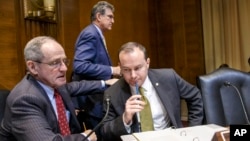The new Republican-led U.S. Senate is wasting no time pressing for construction of a controversial oil pipeline from Canada. The chamber's Energy Committee approved the project 13-9, moving Congress one step closer to a confrontation with President Barack Obama, who has threatened a veto.
Keystone XL would expand existing North American pipelines to transport crude oil from Alberta, Canada to U.S. Gulf states. The Obama administration has yet to finalize a six-year review of the proposal, but the president has expressed strong doubts about the project.
House and Senate bills would bypass the administration and force approval. Republican John Hoeven authored the Senate bill, which cleared its first hurdle Thursday in the Energy Committee.
“Energy is a foundational industry," he said. "We not only create jobs and economic growth and [boost] national security as we produce more energy here at home and work with Canada to have North American energy security, but lower energy costs make our country more competitive in a global economy.”
If constructed, the pipeline’s direct impact on the U.S. economy and global petroleum supplies is expected to be modest. The issue, however, has provoked a fight involving America’s energy sector and environmentalists and their allies in Congress.
Independent Senator Bernie Sanders says the pipeline will add to global warming.
“I am very worried about the U.S. Congress turning its back on science, turning its back on those who tell us we have to cut carbon emissions rather than give a green light for the exploration and production of some of the dirtiest oil on this planet," he said. "That is crazy.”
Many Democrats question the need for Keystone when the world is experiencing an oil glut and fuel prices are at a six-year low. Republicans counter that a boost to North American oil production helped bring about that change and should be fostered further.
Other points of contention include whether crude oil, once refined, would remain in the United States or be exported, and who would be responsible for cleanup costs in the event of spills or leaks.
Late last year, the Senate, then Democrat-controlled, narrowly rejected Keystone. With Republicans now in charge, congressional approval is all but certain - possibly next week. Republicans say they believe they have the two-thirds votes that would be required to override a presidential veto, setting up the first major test of Obama’s ability to rein in an opposition-run legislature.





